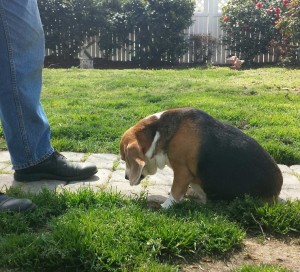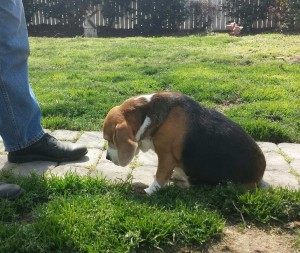Original article by S. Veigel 04/07/2014

Approach or call August and
she takes a humble position.
In February 2014 the Associated Press produced an article about whether or not dogs feel “shame” and social media exploded. So since my articles are under the heading “My Two Cents” you know I had to weigh in. I read many of the comments declaring that dogs do feel shame because they’re social animals, went to some “Dog Shaming” sites, looked at videos of dogs “feeling shame” and tried to be understanding of what people thought they were seeing. And most of all I consulted “my staff”. You know the four legged guys I always talk about?
Now, I’m the guy who wrote the article “Do dogs have souls”. I am constantly trying to push the understanding that dogs (and other animals) are sentient self-aware intelligent beings with feelings much like ours. So if I take you down a slightly different path for a moment I’m hoping you’ll hear me out. Because on one side of this argument people are being too clinical without helping people understand and on the other side people are simply misunderstanding their dog; just a little.
So in 2013 I was in my backyard when I heard a dog yelping then realized there was a dog fight. When I went out front there was a young man on the corner with one dog and a young girl (teenagers) with the other in front of my house. The dog she had was in a rigid fighting stance staring down the street toward the other dog. The girl had blood on her hand and was on her cell phone screaming at her mother to come and get her.
Apparently they were trying to get the two dogs to meet. One dog was aggressive and the other was timid. When it all went wrong the timid dog couldn’t back away because he was held in position by the leash and his close proximity irritated the aggressive dog. The aggressive dog was also held in position and that’s when the aggressive dog bit a piece off the timid dog’s ear. So the dog conversation was something like, “if you don’t get out of my face I’m going to hurt you”. And he did.
As the girl paced nervously back and forth screaming at her mother she kept showing the dog in the fighting stance the blood on her hand. “Look at what you did!” she screamed at the dog. Once I figured out it wasn’t her blood I tried to get her to calm down and stop showing the dog the blood on her hand. But she kept it up once again screaming at the dog, “Look at what you did! You did that!”
So what’s going on here? Do you think the dog “knows” what she’s saying or feels bad about biting the other dog? I tried again asking her to please stop showing the dog the blood on her hand but she just kept yelling, “Oh he knows what he did! He knows exactly what he did!” Then I finally got her to change her thinking but I had to repeat myself several times. “When you show the dog the blood you’re saying ‘get the scent and go hunt’”, I explained. The dog was still tensed up ready to go. What his body language says is, “ok, let go of the leash and I’ll go get him.”
Like most people, over the last 6 decades of my life I’ve noticed that lovers and good friends often get into horrendous arguments over a word. They’re making a point and then suddenly realize that they used a word, or words, that mean something different to the person they’re speaking with. Then, instead of making their point and being understood they’re trapped in a side argument trying to explain what they meant when they used the word and what the word actually means. So before we continue let’s first agree what the word “shame” means.
The Merriam-Webster Dictionary defines “shame” as follows:
1: “a painful emotion caused by consciousness of guilt, shortcoming, or impropriety.”
2: “a condition of humiliating disgrace or disrepute.”
3. “something that brings censure or reproach; also: something to be regretted.”

Look away and
August looks up
In “Dog behavior 101” I talked about how the wolf pack was predominantly the immediate family. The two driving forces that brought us to the dogs we have today are the need for food and the need to belong. The social need to belong brings with it the need to please and in contrast this means the ability to feel rejection. In the dog or wolf pack (family) if you anger one of the members rebuke is swift and can be severe. But then it’s over and everyone moves on. There’s no waiting to let the offending dog consider what it did, no conversation about why it was wrong and no lasting sense of disgrace. One dog says, “That irritates me, don’t do it!” and the other dog lowers its head, tucks its tail, cowers in a non-aggressive position and makes no threating eye contact. Unless the offending dog intends to fight it is startled and feels genuine fear of being harmed when it’s rebuked.
In the photos of August posted here you see her with her head hung low. If you tell her to “come” or approach her head on she will most often hang her head almost to the ground and resist your attempt to lift her head up. When she curls up next to you she’ll frequently push herself to make her contact with you tighter. And she is constantly grooming Millie and trying to lick your face as an act of appeasement. The rest of the time she’s playful, opinionated and very happy.
August grew up in an outdoor kennel. When the weather was too cold the dogs were put into carriers stacked on top of each other. When she needed her claws trimmed someone would grab her and grind them down with a Dremel rotary sander while she peed herself. When it was time to go to a dog show she wouldn’t be fed just so the owners didn’t have to stop and let the dogs out to do their business. So although she looks like she is ashamed in that posture she’s really just saying, “I’m humble. Don’t be angry, don’t hurt me’.
These are very real feelings dogs have. So I’m not going to agree with the concept that our dogs just know how to work us. But we still need to answer the question, are those feelings “shame”?

Look back at her
and August looks down
On the “dog shaming” websites where you see a dog with a sign hung around its neck saying something like, “I ate mommy’s cell phone” the intent is just some laughable fun; something all dog owners can relate to. But when you look at “dog shaming videos” on YouTube you see something different. It’s still just meant to be cute and no one is hurting their dog but it gives you the opportunity to see the dog in action. Go there. Look into the dog’s eyes and pay attention. What I see, for example, is a woman with a pillow saying something like, “did you eat mommy’s pillow?” The dog is cowering trying not to stare into her eyes.
The dog isn’t stupid. He has seen the pillow before. But the dog is focused on her displeasure while she’s holding up the pillow. He’s trying to take the smallest non-threating posture he can possibly manage. He has no idea she’s referring to the rip in the fabric. But somehow that pillow now held in that position is part of a symbol of trouble. He might even start feeling like he’s in trouble when any pillow is held up. August used to cower and run away any time we held up a bag. Why? Because there’s a language barrier and he’s trying to infer what you mean when you hold up a pillow with a stern face.

Look away and
August looks up
If you can correct a dog the moment he’s ripping the pillow he’ll have a better chance to understand that it’s the ripping itself that’s not acceptable. But the pillow probably got ripped when the lady was gone. The dog didn’t rip it because he was bored or vindictive. He was trapped alone and didn’t know where she was. He was feeling anxious smelled her scent on it, wanted to be comforted by the scent and then started tearing it to relieve the anxiety (the story “And Then Came Charlie” tells you how I resolved separation anxiety). Now, hours later, she’s holding up the pillow and the act of ripping isn’t in the conversation as far as the dog knows.
“Shame” is “a condition of humiliating disgrace or disrepute”. It generally refers to how we feel in contrast with the opinion of others. We often say, “I was so ashamed” (past tense). When we feel “shame” we withdraw and whenever we think about what happened in the past we are apt to once again feel that “shame”. When we’re rebuked we don’t always feel shame. Sometimes we think we were actually right but the rebuke makes us understand that someone in charge doesn’t want that. We learn not to do that thing but we’re not ashamed.
The girl in the opening anecdote kept showing the dog the blood on her hand saying, “Look what you did!” She kept screaming, “Oh he knows what he did! He knows exactly what he did!” No, he didn’t. She was just repeating something she learned as a human. Neither of the dogs knew or cared what she was saying and her insistence did nothing to help the situation. She was so self-involved she never stopped to look at or consider what the dog was saying. The dog with the pillow sees pillow, sees and hears disapproval but most likely has no idea that it was the ripped fabric that brought rebuke.

Look back at her
and August looks down
So if I were to say dogs don’t feel shame and you have a strong negative reaction, I understand. What you’re really feeling is a need to defend the understanding that dogs have feelings. I have the same need. But if we’re going to have a better relationship with our dogs and actually help dogs like August and Charlie we need to bend a little. We need to step out of our complex human way of thinking and actually try to see what the dog is saying; not what we want to say. Does the dog associate why we’re displeased? Are we trying to communicate better? In most cases it’s the dog that struggles to understand, not the human. That’s what needs to change.
Once the dog receives correction or rebuke under normal circumstances and the conflict is over the dog jumps up and goes out to play. They never analyze why they’re a dog or speculate on their own self-worth. They never compare or measure themselves by what anyone else is doing. They deal with things as they come and they’re never ashamed to do what comes natural. And maybe that’s a good thing.